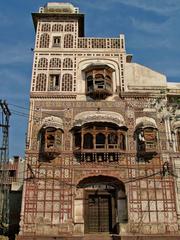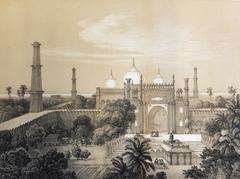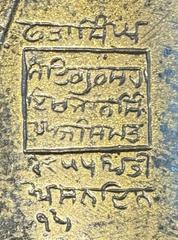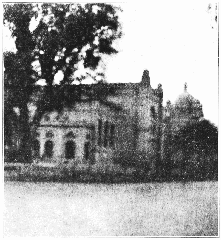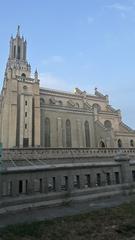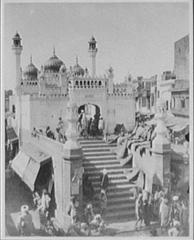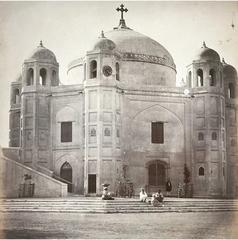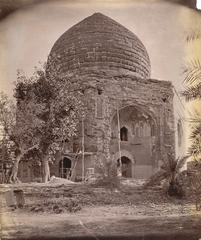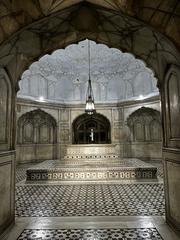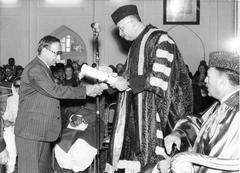
Fakir Khana Lahore: Visiting Hours, Tickets, and Historical Guide
Date: 03/07/2025
Introduction
Nestled within the historic Walled City of Lahore, near Bhati Gate and the vibrant Anarkali Bazaar, the Fakir Khana Museum stands as one of South Asia’s largest and most significant privately owned museums. Established by the esteemed Fakir family—whose lineage traces back to 18th-century Central Asia—Fakir Khana offers visitors an immersive journey through the region’s rich and layered past, spanning the Mughal, Sikh, and British colonial eras. The museum’s collection, housed in a magnificent early 20th-century haveli, encompasses over 13,000 to 20,000 artifacts, making it a vital repository of art, history, and culture (Gulf News; Locally Lahore; Vacay Adviser).
This comprehensive guide details Fakir Khana’s historical significance, collection highlights, visiting hours, ticketing procedures, accessibility, travel tips, and nearby attractions—offering everything you need to plan a memorable visit to this unique Lahore historical site.
Table of Contents
- Introduction
- Historical Background
- Collection Highlights
- Plan Your Visit
- Nearby Attractions
- Cultural and Educational Impact
- Frequently Asked Questions (FAQs)
- Conclusion and Recommendations
- References
Historical Background
The Fakir Family and Their Legacy
The Fakir Khana Museum is the legacy of the distinguished Fakir (or Faqir) family, originally from Bukhara (now in Uzbekistan). The family settled in Lahore around 1730 amidst the turmoil following the decline of the Mughal Empire. During the Sikh rule under Maharajah Ranjit Singh, the Fakir brothers—Syed Azizuddin, Syed Imamuddin, and Syed Nuruddin—served as key ministers and advisors. Their high standing enabled them to amass a remarkable collection of gifts, manuscripts, and artifacts, many of which form the foundation of the museum today (Gulf News; Locally Lahore).
The Haveli: Architecture and Atmosphere
Fakir Khana is housed in a traditional haveli located in the Bhati Gate area, close to the historic Bazaar-e-Hakeema. The haveli showcases Mughal and Punjabi architectural styles, featuring carved wooden doors, stained glass windows, airy courtyards, and high ceilings. Its location within the Walled City immerses visitors in Lahore’s living history and bustling urban fabric (Gulf News; RHF Pakistan).
Collection Highlights
Fakir Khana’s extensive collection spans several centuries and civilizations, reflecting the cultural diversity of Lahore and the region.
Notable Artifacts
- Miniature Paintings: Over 160–180 Mughal, Persian, Sikh, Rajput, and Pahari miniatures, including a portrait of Nawab Mumtaz Ali—created over 15 years with a single hair brush (Academia.edu).
- Manuscripts and Calligraphy: Approximately 10,000 manuscripts, including rare Qur’ans in Kufic script, Persian poetry, and Sikh religious texts.
- Sikh Empire Relics: Diplomatic gifts from Maharajah Ranjit Singh (such as his robe and Maharani Jinda’s Kashmiri shawl), ceremonial weapons, and textiles.
- Decorative Arts: Carpets, Kashmiri shawls, silk garments, and European and Chinese porcelain.
- Gandhara and Buddhist Artifacts: Sculptures, pottery, and ivory carvings from the ancient Gandhara civilization.
- Coins and Jewelry: Coins from Mughal, Sikh, and British periods, and personal jewelry of the Fakir family.
- Furniture and Woodwork: Colonial and traditional Punjabi furniture, including pieces attributed to Bhai Ram Singh.
- Photographs and Portraits: Rare images of Lahore’s past and prominent personalities.
The museum’s curation preserves the authentic setting of a lived-in haveli, with descendants of the Fakir family offering personalized tours infused with familial anecdotes and historical context (Academia.edu).
Plan Your Visit
Visiting Hours and Tickets
- By Appointment Only: Fakir Khana Museum is open exclusively by prior appointment, typically from Tuesday to Sunday, 10:00 AM to 5:00 PM. It is closed on Mondays and major public holidays.
- Entry Fee: There is no fixed ticket price; entry is free, but voluntary donations are appreciated to support preservation.
Booking and Accessibility
- How to Book: Contact the museum directly by phone or email (refer to the official travel page), or arrange through the Walled City of Lahore Authority. Book at least a few days in advance.
- Accessibility: The historic architecture includes narrow staircases and uneven floors, with no wheelchair access. Visitors with mobility needs should discuss accommodations in advance.
Visitor Tips
- Getting There: The museum is best reached by rickshaw or on foot due to the narrow lanes of the Walled City. Allow extra time for navigating traffic and alleys.
- Dress Code: Modest attire is recommended in respect of local customs.
- Shoe Policy: You may be asked to remove your shoes before entering certain areas.
- Group Size: Small groups are preferred to maintain the museum’s intimate setting and protect artifacts.
- Photography: Photography inside is generally not permitted to protect sensitive artifacts; courtyard photography may be allowed with permission.
- Language: Guided tours are offered in English and Urdu.
Nearby Attractions
Fakir Khana’s central location makes it an ideal starting point for exploring Lahore’s historic core. Notable nearby sites include:
- Lahore Fort: UNESCO World Heritage Site with palaces and gardens.
- Badshahi Mosque: A masterpiece of Mughal architecture.
- Wazir Khan Mosque: Famed for its intricate tilework.
- Shahi Hamam: Restored Mughal-era bathhouse.
- Food Street: Offers traditional Pakistani cuisine with rooftop views over the city.
These attractions collectively provide a deeper understanding of Lahore’s vibrant heritage and are within walking distance of Fakir Khana (Vacay Adviser).
Cultural and Educational Impact
The Fakir Khana Museum not only preserves invaluable artifacts but serves as a critical educational resource for scholars and students. Its collection supports research in art history, Islamic studies, and South Asian culture, and is regularly cited in academic work (Gulf News). The museum also embodies Lahore’s tradition of cultural pluralism, showcasing Muslim-Sikh collaborations and the city’s syncretic identity.
Frequently Asked Questions (FAQs)
Q: What are the Fakir Khana Museum visiting hours?
A: The museum is open by appointment only, typically Tuesday to Sunday, 10:00 AM–5:00 PM. Closed on Mondays and public holidays.
Q: How do I book a visit?
A: Contact the museum through their official channels or via the Walled City of Lahore Authority; book at least several days ahead.
Q: Is there an entry fee?
A: Entry is free, but donations are welcome to support preservation.
Q: Are guided tours available?
A: Yes, personalized tours are led by family members or appointed guides in English and Urdu.
Q: Is the museum accessible for people with disabilities?
A: Accessibility is limited due to the historic architecture; discuss your needs when booking.
Q: Can I take photographs inside the museum?
A: Photography inside is generally not allowed to protect artifacts; courtyard photography may be permitted with permission.
Conclusion and Recommendations
Fakir Khana Museum is a living testament to Lahore’s rich, pluralistic history and artistic heritage. The combination of its vast collection, authentic setting, and the warm stewardship of the Fakir family makes for an unforgettable cultural experience. Advance booking is essential, and visitors should prepare for the unique ambiance and etiquette of this private museum.
For travelers, scholars, and art enthusiasts alike, Fakir Khana offers a rare opportunity to witness Lahore’s past come alive. To enrich your visit, combine your tour with explorations of the Walled City’s other historical landmarks.
Download the Audiala app for real-time updates, guided tour options, and exclusive content about Lahore’s hidden treasures. Stay connected via social media for news on special events and new exhibitions at Fakir Khana.
References
- A museum is witness to Lahore’s rich past, Gulf News
- Fakir Khana Museum, Locally Lahore
- Best Places to Visit in Lahore, Vacay Adviser
- Fakir Khana Museum Travel Details, RHF Pakistan

